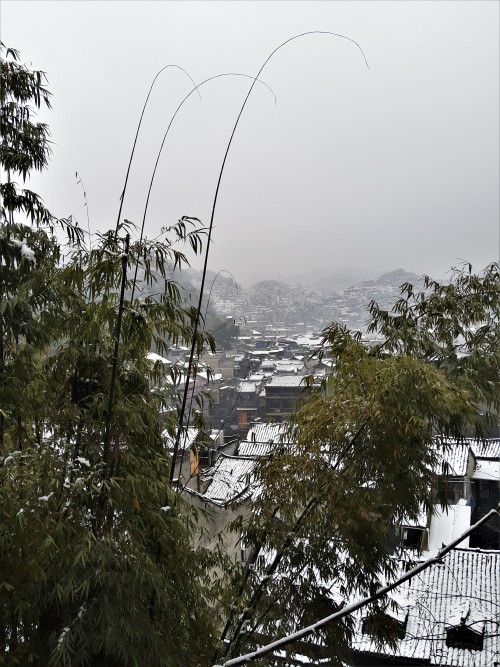Reviewing Tones As An Intermediate In Chinese
Reviewing tones as an intermediate in Chinese
As a beginner it takes a bit of time to become accustomed to be able to hear the difference in tones, yet alone pronounce them very correctly. By the time you get to intermediate you probably can hear the difference in tones but you may still have trouble pronouncing every single word correctly. However you most likely have a number of words that you have heard so often that you do pronounce correctly. For example 中国 zhong1 guo2, I bet most intermediates pronounce this is the correct tone as it is a word occurring so often that our brains automatically imitate pronunciations. However, when we encounter a new word we may have difficulty getting the tone just right, and then you need to remember it too.
I have two bits of advice that may help with this, that I myself am using to improve my tones over time:
As soon as you learn a new word, repeat at least 10 times in the correct tone.
As I said when speaking Chinese, you are speaking at a speed that you don’t have time to remember which tone the word is, you say it how you remember it. So when you learn a new word you want to try to cement the correct ‘rhythm’ (or tone) of the word in your head. If you remember the incorrect one it may be difficult to undo this. (i remember I pronounced 文化 as wen2 hua2 for the longest time and it was difficult to change this to wen2 hua4 in my head when i discovered i had been saying it all wrong!)
Memorise a few ‘tone pairs’ to remember the ‘rhythm’ when you learn a new word.
Hacking Chinese ( https://www.hackingchinese.com/focusing-on-tone-pairs-to-improve-your-mandarin-pronunciation/ ) has a great article on tone pairs and it’s merits. Recently when i learn a new word I recall the 'model’ word that I have for that particular tone pair, say it a few times to remember the 'rhythm’ of the word, the n say the new word I want to learn in that same rhythm, therefore it will help saying the word in the correct tone.
For example, lets say I learnt the new word 生活 sheng1 huo2, this has the same tone pair as 中国, therefore when i learn 生活 i can easily recall how 中国 is pronounced and imitate the same rythym when i said 生活. I created a table for myself with the tone pairs and so each time I encounter, for example any word that is first tone-second tone (such as 中国), then i can recall the rythym easily in my head.

This table has a list of words that I subconsciously pronounce with the correct tones as a result of hearing them so many times, there are however too many words that i don’t pronounce in the correct tone, hence i use this method to help :P
(ignore my terrible handwriting!)
Please try this out and let me know if you try this out and how it works for you??
More Posts from Lia-kotik-blog and Others
Tips for Writing Sentences in a Foreign Language - for Beginners
Having studied 3 foreign languages at varying degrees of intensity and success - Japanese (I flatter myself to be fluent), Spanish (I can ask some simple questions and possibly crudely insult someone), French (I can say a few well-sounding phrases and then smile & nod when you respond). When beginning studies in languages, one of the most challenging things is to jump from the set beginner phrases from the textbook into creating your own sentences (gasp).
From my own language studies, plus experience TA'ing first year Japanese, I have a few tips for beginners on taking that leap into creating your own sentences. These will probably lean heavily on Japanese because that is the language I have the most experience with, but they are applicable to other languages too.

1. Just start making sentences!
It sounds simple, but it's the best way to start. Writer's block? Write about what you are doing, what you want to do, or write an introduction. Worried about speaking? Talk to yourself about what you are doing, what you want to do, or introduce yourself to yourself. You don't have to write or say anything world-shaking, but getting started is the first step. You can start by modeling sentences you've already seen. If you have an example textbook sentence, try modifying it to make your own similar sentence.
PS. Your sentences don't have to be perfect either. If you notice a mistake later, just go back and correct yourself!
2. Don't try to translate the phrase from your native language EXACTLY into your target language.
Languages don't always translate exactly, but also, sometimes your skill isn't advanced enough to say the same things you can say in your native language. If you don't yet know the appropriate grammar, vocabulary, or syntax of what you want to say, not being able to say exactly what you want can be frustrating and lead you to feel defeated (personal experience here). Instead, think of how to put the idea you have into a sentence using the knowledge you DO have.
If you have just started learning a language, it might be too much to directly translate "Entities should not be multiplied unnecessarily" (thanks, Ockham's Razor). Instead, why not try to translate "Simple is best"?
3. Avoid heading straight for the dictionary if possible when there is a word you don't know in your target language.
If you don't have the vocabulary word you need in a sentence, you might be tempted to go to the dictionary and look it up and throw it into your sentence. Whilst TA'ing first-year Japanese, this led to me puzzling and scratching my head over what the student was trying to say in their homework (hey, it's not my first language either!).
While using the dictionary to learn new vocabulary is obviously a must, when you are just starting out with sentence building it can also be a roadblock. When conjugating verbs is new to you, try using the verbs you do know to explain your idea. If you don't know a vocabulary word, selecting the right one for your context from a list of words with similar definitions can be difficult. If you don't quite know how to explain what you want to say, try rephrasing it until you can compose a less complicated sentence. Or break it into several sentences - you can work on complicated sentences when you're more comfortable with simpler ones!
Another bonus is that learning to explain what you want to say in your target language when you don't know the vocabulary is a helpful lifelong skill (that I still use today in Japanese). It can be frustrating to not be able to say exactly what you want to say in your target language at first, but if you just keep practicing you will get there.
4. Practice making sentences on the fly.
Writing allows you more time to think out the sentence, go back and make changes, and work things out more slowly. Speaking, on the other hand, is more challenging because you have to make your mouth form the words you are thinking, and do your best to make the sentence make sense to your listener. While writing sentences helps me to remember how to write hiragana/katakana/kanji and reinforces grammar (I learn best by writing it out!), speaking out loud helps your brain and your mouth learn to work together in your target language.
Don't have anyone to talk to? That's ok! Talk to yourself. Talk to your imaginary friends. Talk to your pet or your houseplant or your favorite figurine or stuffed animal. Just practice putting sentences together out loud, in real time. I promise you will notice improvement if you practice daily!
5. Don't be afraid of making mistakes!
But even if you do just throw in the dictionary word and your professor/study buddy/language exchange partner has to ask you what you were trying to say, that's ok! Making mistakes is ok! That's how you learn. Don't be afraid to be wrong, to be mocked and ridiculed.. ok, you most likely won't be mocked and ridiculed. (If you are, please find new language friends.)
Language learning is about making mistakes. Even now, after YEARS of studying and speaking and even doing interpretation/translation... I make mistakes (gasp). And it's ok. Ok, sometimes I think about the mistakes I have made in conversation in the middle of the night, but I'm working on that too. One day, you'll look back, and realize that agonizing over particles and which kanji to use and whether or not you would sound dumb when you were speaking to a native speaker is not the part you remember. You will remember when you could barely write your name in katakana, and realize that suddenly you can talk about your favorite hobby in exacting detail.
6. Don't practice in a vacuum.
Practicing sentences, written or spoken, on your own is fine! It's a great way to learn and improve your language skills. But I would recommend not spending all your time studying and practicing in a vacuum. There are lots of online ways to get your writing or speaking corrected (paid or not), and I would recommend taking advantage of them. I have gotten into the habit of using certain words that are too informal or that are not correct in the context I wanted to use them in, and it took a native speaker to point them out since I had become so used to using them (and so sure that I was right). So make sure to practice your language outside of your own head, and you will be able to improve even more.
So, what next?
Get out there and start making sentences! Write them, say them, and just practice. Don't stress about being perfect or making sentences that will change the course of history... instead, just start making sentences!
頑張ってね!
Linguistics Terms in Chinese
*Common terms found in textbooks, on tests, etc. that no one has ever taught me explicitly; will update periodically through reblogs-please share if you know other ones!! We can use these words to talk about our study, ask for help, or better understand test questions and practice sets.

语法 -grammar
生词 - vocabulary
口语 -speaking
写字 -writing
阅读 -reading
跨文化交际 - cross-cultural communication
汉字 - characters
拼音 - pinyin
偏胖 - character radicals (e.g. 口袋的口)
名词 -noun
动词 -verb
副词 - adverb
状语 -adverb phrase
量词 -measure word
连词 -conjunction
句子 -sentence
主语 - subject of a sentence
分句 - sentence clause
注释 -explanatory notes
不同点 -differences
对话 - dialogue
专有名词 -Proper nouns
词义 -meaning of a word, definition
形合 -a linguistics term that literally means “shape focused;” it refers to the way that languages like English focus more heavily on structures like grammar to be intelligible; in contrast to the below term, 意合
意合 -a linguistics term that literally means “meaning focused;” it refers to languages like Chinese that focus more heavily on meaning, so they can rely on repetition of certain words or phrases within a sentence or utterance without sounding redundant; in contrast to the above term, 形合
练习 - practice
复习-review
预习 - preview
考试 -test
做作业 - do homework
例如 - example
判断对错。 - judge true or false.
题 - question (usually 第 + # + 题)
请选出真确回答。 - choose the correct answer.
选词填空。-fill in the blanks.
排列顺序。- arrange / put in order of sequence.
部分 -part (usually 第 + # + 部分)
完成句子 - finish the sentences.
Some language learning exercises and tips
These are some of the activities I do. Maybe you'll find them helpful:
Write a mock dating profile for yourself. Describe yourself, list your hobbies and interests, hopes for the future, likes and dislikes, and the qualities you're looking for in a partner. Enjoyed it? Write one for your favourite character/OC.
Try to find a Youtuber who plays your favourite game and does commentary in your target language. I watch this guy a lot.
Describe locations in your favourite books, games, movies, TV shows etc. I like to wander the Hitman maps and write about the different areas, NPCs, and situations I observe.
Write a mock interview with your character/influential figure of choice.
Choose a fairy tale and write your interpretation of it in your target language.
When you're cooking, say what you're doing out loud as if you were talking to a studio audience.
Imagine your mutuals are coming to your city for a visit. Write up a lil guidebook for them describing places of interest. Write an itinerary to practice using the future tense and "first", "then", "after that", etc statements.
A chalk marker might be useful to you. I write important words and phrases that I'm having trouble remembering on my bathroom mirror. I just wipe them away with a damp cloth later.
Review books, albums, movies etc in your target language. Either write down your review or record yourself talking about it.
Some language learning exercises and tips
These are some of the activities I do. Maybe you'll find them helpful:
Write a mock dating profile for yourself. Describe yourself, list your hobbies and interests, hopes for the future, likes and dislikes, and the qualities you're looking for in a partner. Enjoyed it? Write one for your favourite character/OC.
Try to find a Youtuber who plays your favourite game and does commentary in your target language. I watch this guy a lot.
Describe locations in your favourite books, games, movies, TV shows etc. I like to wander the Hitman maps and write about the different areas, NPCs, and situations I observe.
Write a mock interview with your character/influential figure of choice.
Choose a fairy tale and write your interpretation of it in your target language.
When you're cooking, say what you're doing out loud as if you were talking to a studio audience.
Imagine your mutuals are coming to your city for a visit. Write up a lil guidebook for them describing places of interest. Write an itinerary to practice using the future tense and "first", "then", "after that", etc statements.
A chalk marker might be useful to you. I write important words and phrases that I'm having trouble remembering on my bathroom mirror. I just wipe them away with a damp cloth later.
Review books, albums, movies etc in your target language. Either write down your review or record yourself talking about it.











©AirRabbitYan
best video ever
I don’t know what this is all I know is that I can’t stop thinking about it






Winter in Fenghuang, Hunan
A man in Inner Mongolia, China, comparing the sizes of goats at different ages.
English added by me :)
Some chinese resources (found in this article: https://kaohongshu.blog/2019/12/03/should-i-read-chinese-texts-above-my-level/
Where do I find suitable online reading resources?
Free online resources:
My Chinese Reading (all levels) *I’ve used this it’s great, especially as graded reading material that gradually increases in difficulty in a manageable way
Mandarin Bean (all levels)
HSK reading (all levels) *Just looked, seems good for finding graded reading material specific to HSK level
Chinese Reading Practice (all levels) *I’ve used this, also great for graded reading material that manageably increases in difficulty
Just learn Chinese (all levels)
The Marco Polo Project (advanced)
Mandarin version of the New York Times (advanced)
BBC news in Mandarin Chinese (advanced)
Chinese news from Deutsche Welle (advanced)
Project Gutenberg in Chinese (highly advanced)
An Annotated Collection of Digitized Chinese Texts for Students of Chinese Language and Culture (highly advanced) *I’m looking at this right now and a ton of useful material
看電視劇學中文:【開端】 第三集 【2/2】
這是第二部分,來自:【開端】 第三集 20:00-40:00 // 第一部分在這裡 你們可以在Youtube看:这里 看電視劇學中文Learn Chinese With a TV Series by Leila老師
單詞:(绿色=HSK4; 蓝色=HSK5; 紫色=HSK6)
反复 (-覆) / fǎnfù / repeatedly, over and over
药检 (藥檢) / yàojiǎn / drug test
惯 (慣) / guàn / to spoil
负担 (負擔) / fùdān / burden
从始至终 (從--終) / cóng shǐ zhì zhōng / from the start to the end
唯一/ wéiyī / only
相信 / xiāngxìn / to be convinced sth is true; to believe
交代 / jiāodài / to hand over; to explain; to brief (someone)
达成 (達-) / dáchéng / to accomplish
共识 (-識) / gòngshí / consensus
插曲 / chāqǔ / interlude (music); episode
必然 / bìrán / inevitable
炸药 (-藥) / zhàyào / explosive material or charge
痕迹 (-跡) / hénjì / mark, trace
倒计时 (-計時) / dàojìshí / countdown
装置 (裝置) / zhuāngzhì / device; to install
眼皮底下 / yǎnpídǐxia / right before one's eyes
资料 / zīliào / material, resources
人际关系 (-際關係) / rénjìguānxì / interpersonal relationships
不良 / bùliáng / bad, harmful, unhealthy
嗜好 / shìhào / habit
心理防线 (---線) / xīnlǐfángxiàn / psychological barrier
硬 / yìng / hard, stiff, firm, strong
性质 (-質) / xìngzhì / nature; characteristic
指使 / zhǐshǐ / to prompt, incite
套话术 (-話術) / tàohuàshù / testimony
依然 / yīrán / still; as before
指认 (-認) / zhǐrèn / to identify
采纳 (採納) / cǎinà / to accept
供词 (-詞) / gòngcí / confession; statement
残留物 (殘--) / cánliúwù / leftover, remains
检测 (檢測) / jiǎncè / to examine
薄 / báo / weak, thin, flimsy
没凭没据 (沒憑沒據) / méipíng méijù / no evidence (var. 无凭无据)
下面有句子:
我们会反反复复地过着一整天。We will repeatedly experience the same day.
准备药检。Prepare the drug test.
老张还是太惯着你了。 Mr. Zhang is spoiling you.
你有很重的心理负担。You have a heavy burden (in your heart/mind).
从始至终我没有向你做过自我介绍。This whole time (from start to finish) I never introduced myself to you.
对你来说,相信警察,诚实把交代问题是你的唯一的选择。For you, believing in the police and answering questions honestly is your only choice.
我们终于达成了共识。We finally reached a consensus.
公交车被引爆这才是必然。The bus exploding was inevitable.
你们是不是可以找到一些炸药的痕迹。 Could you find any trace of a bomb/explosive material?
倒计时装置是它的铃声。The countdown system is the ringtone.
在我们眼皮底下演这么一出,从目前掌握的资料来看两个人的人际关系简单。From what we see before us from the resources we've currently have, these two people have simple social histories.
没有不良嗜好。Don't have bad habits.
实际心理防线硬着呢。Really (her) psychological barrier is strong.
那可是完全不同的性质。That could be a completely different characteristic.
她指使你骗出了这个套话术。She incited you to lie on this testimony.
如果你依然不肯如实地告诉我们的话,我们最后只能采纳他指认你是案一的供词。If you still won't agree to honestly tell us (the truth), (then) we have no choice but to accept his identification of you as the case's only confession.
事故现场检测出了爆炸残留物。At the accident site, examine the explosion's remains/residue.
心理防线薄。Weak psychological barrier.
没凭没据什么关我。There is no evidence that it was related to me.
-
 bibilearnsstuff reblogged this · 4 months ago
bibilearnsstuff reblogged this · 4 months ago -
 linguaidiota reblogged this · 2 years ago
linguaidiota reblogged this · 2 years ago -
 lia-kotik-blog reblogged this · 3 years ago
lia-kotik-blog reblogged this · 3 years ago -
 meumandarim reblogged this · 3 years ago
meumandarim reblogged this · 3 years ago -
 lisastudyingchinese liked this · 3 years ago
lisastudyingchinese liked this · 3 years ago -
 webgoru-blog liked this · 3 years ago
webgoru-blog liked this · 3 years ago -
 ilovethemayhemmorethanthelove liked this · 3 years ago
ilovethemayhemmorethanthelove liked this · 3 years ago -
 2dou reblogged this · 3 years ago
2dou reblogged this · 3 years ago -
 marilearnsmandarin liked this · 3 years ago
marilearnsmandarin liked this · 3 years ago -
 outinthewilde liked this · 3 years ago
outinthewilde liked this · 3 years ago -
 wo-bu-hui-shuo-zhongwen reblogged this · 3 years ago
wo-bu-hui-shuo-zhongwen reblogged this · 3 years ago -
 youngk-hun liked this · 3 years ago
youngk-hun liked this · 3 years ago -
 fishmech liked this · 3 years ago
fishmech liked this · 3 years ago -
 tomtomtom36 reblogged this · 3 years ago
tomtomtom36 reblogged this · 3 years ago -
 amethystlanguages reblogged this · 3 years ago
amethystlanguages reblogged this · 3 years ago -
 archaotype reblogged this · 3 years ago
archaotype reblogged this · 3 years ago -
 nightvaldez liked this · 3 years ago
nightvaldez liked this · 3 years ago -
 2dou liked this · 3 years ago
2dou liked this · 3 years ago -
 smallxir liked this · 3 years ago
smallxir liked this · 3 years ago -
 levelingupmychinese liked this · 3 years ago
levelingupmychinese liked this · 3 years ago -
 learningnewthingsatleastitry reblogged this · 3 years ago
learningnewthingsatleastitry reblogged this · 3 years ago -
 boredperuvianllamas liked this · 3 years ago
boredperuvianllamas liked this · 3 years ago -
 qiaozhixilaren liked this · 3 years ago
qiaozhixilaren liked this · 3 years ago -
 invisiblespoon reblogged this · 3 years ago
invisiblespoon reblogged this · 3 years ago -
 robosucka reblogged this · 3 years ago
robosucka reblogged this · 3 years ago -
 robosucka liked this · 3 years ago
robosucka liked this · 3 years ago -
 moonunit12 liked this · 3 years ago
moonunit12 liked this · 3 years ago -
 electricheart liked this · 3 years ago
electricheart liked this · 3 years ago -
 woaihanyu reblogged this · 3 years ago
woaihanyu reblogged this · 3 years ago -
 buratinoise reblogged this · 3 years ago
buratinoise reblogged this · 3 years ago -
 buratinoise liked this · 3 years ago
buratinoise liked this · 3 years ago -
 rosekoite liked this · 3 years ago
rosekoite liked this · 3 years ago -
 foxladystudies reblogged this · 3 years ago
foxladystudies reblogged this · 3 years ago -
 7ru57-33-74k3-3y-44nd reblogged this · 4 years ago
7ru57-33-74k3-3y-44nd reblogged this · 4 years ago -
 needmysleep liked this · 4 years ago
needmysleep liked this · 4 years ago -
 dantstudies reblogged this · 4 years ago
dantstudies reblogged this · 4 years ago -
 liliran reblogged this · 4 years ago
liliran reblogged this · 4 years ago -
 gotham-kid-on-a-budget reblogged this · 4 years ago
gotham-kid-on-a-budget reblogged this · 4 years ago -
 lifelineserin-blog reblogged this · 4 years ago
lifelineserin-blog reblogged this · 4 years ago -
 putonghualing reblogged this · 4 years ago
putonghualing reblogged this · 4 years ago -
 thelastoftheredhotswamis2 liked this · 4 years ago
thelastoftheredhotswamis2 liked this · 4 years ago -
 cdrmareviews liked this · 4 years ago
cdrmareviews liked this · 4 years ago -
 theresnoreceptioninpossumsprings liked this · 4 years ago
theresnoreceptioninpossumsprings liked this · 4 years ago